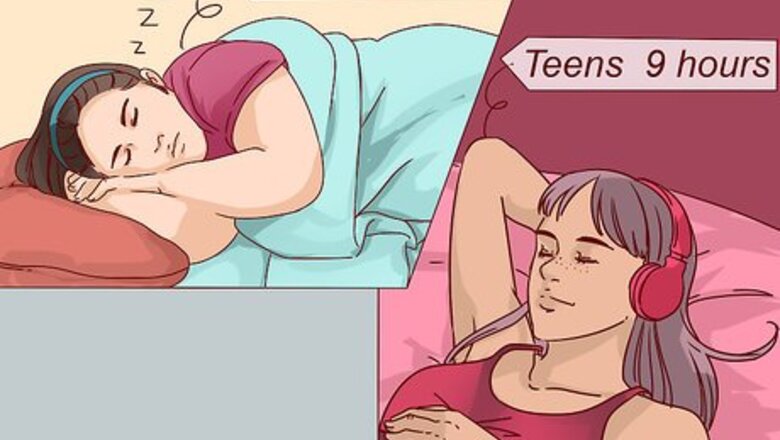
views
X
Trustworthy Source
American Psychological Association
Leading scientific and professional organization of licensed psychologists
Go to source
Get better sleep by staying healthy in your daily activities, having a bedtime routine, avoiding things that keep you awake, and seeking advice when your sleep problems persist.
Creating a Positive Bedtime Routine

Keep a consistent sleep cycle. Avoid erratic sleep schedules where you go to bed at different times each night. You are more likely to feel rested if you begin to unwind and prepare for bed around the same time each day. Keeping your sleep pattern consistent will help to avoid the feelings of sluggishness, lethargy, and fatigue that are commonly associated with depression. Most adults need an average of 8 hours of sleep each night to feel rested. Teens need an average of 9 hours. Keep your sleep cycle consistent even on the weekends.

Create a pre-bedtime routine that helps you unwind. Allow yourself time to "unwind" before bed. Plan for about an hour between the time you start to get ready for bed, until your head hits the pillow. Don't start activities that are stressful, or make you anxious, right before you get ready for bed. This is your time to get relaxed. Having time to "unwind" will help to release negative thoughts, and prepare you for positive sleeping. If you haven't allowed yourself time to unwind, your depressive thoughts may linger when you are trying to fall asleep. Limit time on the computer or cell phone, or watching TV, right before heading to bed. These devices emit something called blue light, which suppresses melatonin production (the hormone that makes you sleepy). In addition, the use of these devices can be stimulating in other ways — you may get sucked into looking at social media or they may remind you of stressful events, particularly if you're watching the news. If you watch anything, keep it positive and inspiring right before bed.
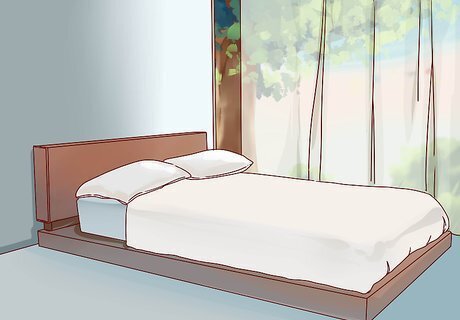
Control your environment as a way to declutter the brain. Depression may feel like it immobilizes you. Reduce these feelings of being overwhelmed by making your bedroom a sanctuary of sleep. Avoid cluttering your room with lots of dirty clothes, loose papers, stacks of books, piles of equipment, or other disorganized things. Here are some ways to make the bedroom more ideal for sleep: Use a white noise machine or fan to drown out external noises, both outside of the room and the home. Make sure the room is dark by using heavy curtains or blinds or using a sleep mask. Make sure your bed is comfortable. Find spots or positions that feel more relaxing if possible. Consider using a body pillow to support your legs, hips, and shoulders. This may lead to better sleep, and ease feelings of loneliness. Keep the room at a comfortable temperature that is well-ventilated. EXPERT TIP Ashley Moon, MA Ashley Moon, MA Professional Organizer Ashley Moon is the Founder and CEO of Creatively Neat, a virtual organizing and life coaching business based in Los Angeles, California. In addition to helping people organize their best life, she has a fabulous team of organizers ready to de-clutter your home or business. Ashley hosts workshops and speaking engagements at various venues and festivals. She has trained with Coach Approach and Heart Core for organizing and business coaching respectively. She has an MA in Human Development and Social Change from Pacific Oaks College. Ashley Moon, MA Ashley Moon, MA Professional Organizer Make your bedroom a calm, restful place. Follow feng shui principles in your bedroom, like keeping electronics out of sight, choosing lower-energy artwork, and dividing work from rest spaces as much as you're able. Cultivating this positive energy will nurture you, and provide better sleep and rest time.

Get out of bed if you're restless. Depression may make your mind and body feel restless. If it is the middle of the night, and you have awoken and can't get back to sleep, then go into another room and do something else (nothing that may be too stimulating) until you feel sleepy again. Consider these activities: Read a book, newspaper, or magazine article that is not too engaging. Do a chore, like washing dishes, folding clothes, or putting away something. Get a drink of water. Pet your animals if you have any. Watch TV with the volume low.
Avoiding Triggers that Keep You Awake
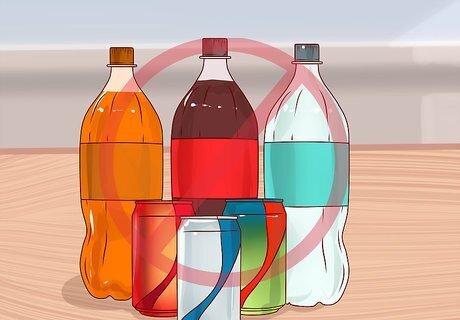
Limit caffeine as a stimulant. While stimulants may help with symptoms of depression such as fatigue, caffeine may keep your mind and body too active at night. Refrain from caffeine four to six hours before bedtime. Drinking more than four cups a day of a caffeinated beverage (soda, coffee, energy drinks) may have serious side effects, including insomnia. Here are some foods to avoid: Sodas with lots of sugar and caffeine Energy drinks Black tea or coffee Chocolate
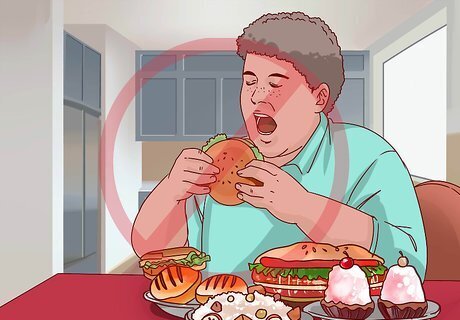
Avoid heavy meals to reduce listlessness. If you're depressed, those feelings of lethargy and lack of concentration may be worse when feeling overly full. Avoid overeating as a way to self-soothe at night. Heavy foods that fill you up and put your stomach to work should be avoided a few hours before bed. Consider these snacks instead of larger meals right before bed, if you prone to late-night munchies: Glass of warm milk or herbal (non-caffeinated) tea A bowl of low-sugar cereal A banana
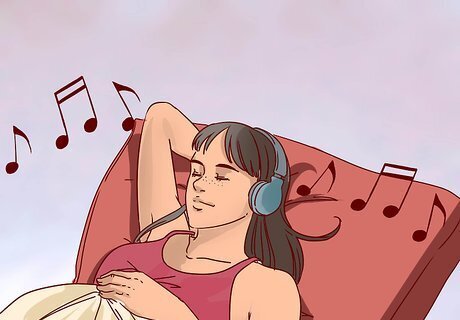
Reduce stressful activities right before bed. Don't do your work for the next day right before bed. This may be stressful and stir up anxieties or feelings of depression. Limit how much you watch TV or look at your phone or computer right before bed. This may distract you from your thoughts, but it also may trigger stress, depression, or anxiety. External forces in the world — work, school, life — should fade away when you hit the bed. Focus on how to relax your muscles and mind instead. Consider these: Put on headphones, and listen to soothing music. Do deep breathing, counting to 10. Focus on your breath. Meditate or pray. Think about three positive things that happened that day, even if they are very small things. Find something to hold like a pillow. You might also consider having your pet sleep with you if they provide comfort.
Being Healthy in Your Daily Life

Get some sunshine to help with depression. Sunlight is important with maintaining your sleep and awake cycles in the body. It also can help boost your Vitamin D in the body. So don't spend all your time indoors, particularly on sunny days. While too much sun exposure can be bad for the skin, it's important to have a healthy dose of sunlight in the day, and darkness at night. It has been shown to help with a good night's sleep.

Exercise to improve your mind and body. Being active can help with depression — in fact, regular exercise has been shown to be as effective as taking antidepressants. Though it is not entirely understood, experts believe that exercise may help treat depression by releasing endorphins or by stimulating the neurotransmitter norepinephrine, which can improve mood. Try to exercise for about 150 minutes each week (that's 30 minutes five days a week). You can start by going for a brisk walk. People who work out for 150 minutes weekly sleep better and feel less sleepy during the day. Consider doing stretches in the morning and night to loosen your muscles. This may help relax your body.

Eat meals on a regular schedule. With depression, it's important to avoid skipping meals or over-eating. Eating on a regular schedule will keep you blood sugar levels stable; spikes and drops in blood sugar can lead to mood swings. In addition, try to avoid sugary foods, which can cause a rise in blood sugar levels as well as caffeine, which can increase anxiety and interfere with your sleep. Avoid spicy foods particularly close to bedtime. Late-night snacks should be limited to light snacks, if at all.
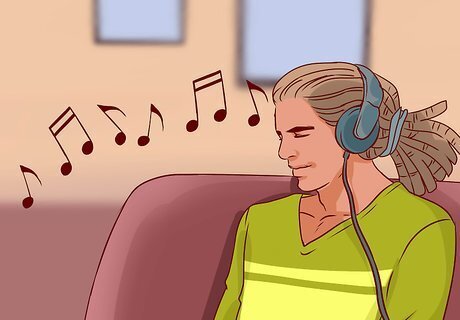
Do things that relax your mind. Depression may feel like it overwhelms your day and triggers negative thoughts too often. Make sure that each day has something positive. Consider activities such as: Listening to music (or playing music) that makes you happy Writing in a journal about three good things that happened that day or week, even the small stuff Playing a game, such as puzzles or word games
Seeking Support

Find support for your depression. Poor or restless sleep (or sleeping too much) is a symptom of depression. People with depression may benefit from improving their sleep patterns as part of their mental health treatment. Identify possible triggers for your symptoms of stress, depression, or anxiety. Seek ways to avoid or reduce these triggers. If your depression has been going on for weeks or months, consider seeking help from a mental health professional, or a healthcare provider, about ways to manage your depression so that your symptoms do not persist or get worse. If you are currently on an antidepressant and your sleep has been affected, discuss these symptoms with your healthcare provider.
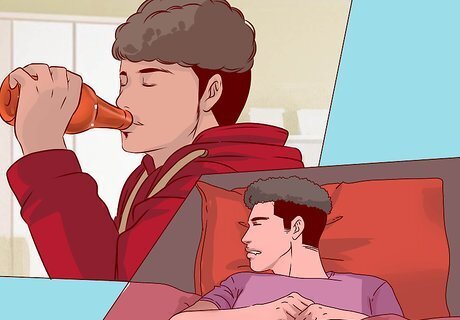
Try positive sleep habits over alcohol. The use of alcohol or other substances may seem like a good short-term fix, but studies show alcohol inhibits good, restful sleep. It may cause you to have poor or restless sleep in the night, even if it helps you initially fall asleep. Mixing alcohol with other sleep aids or medications can be very dangerous, or possibly lethal. In addition, alcohol increases the risk of depression. It may also worsen your depression and become a negative coping mechanism, keeping you from addressing your depression and treating it. Trust that there are other ways, as mentioned above, to get a good night's sleep. Your body will thank you in the long-run.
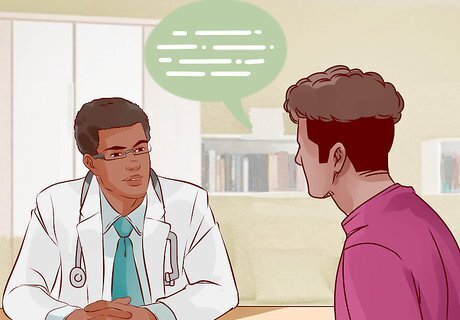
Talk with a healthcare professional. There are many sleeping aids out there, both over-the-counter, and through a prescription. Be cautious of using these regularly to help with insomnia. If you have a persistent issue with sleeping and depression, ask your healthcare provider about these other issues that may be involved: Sleep disorders such as sleep apnea Shift work disorder, if you are working the night shift Other possible medical reasons for chronic fatigue or insomnia














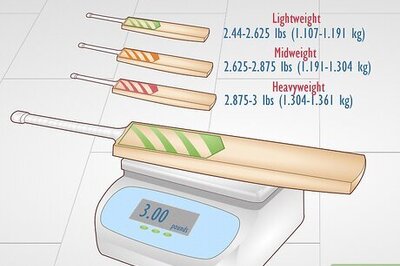



Comments
0 comment